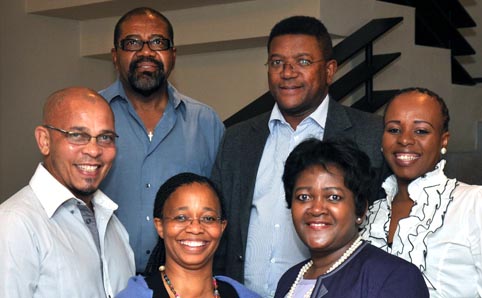Latest News Archive
Please select Category, Year, and then Month to display items
02 January 2025
|
Story Gerda-Marie van Rooyen
|
Photo Supplied
 Leading the research in South Africa is Prof Linus Franke from the Department of Soil, Crop and Climate Sciences.
Leading the research in South Africa is Prof Linus Franke from the Department of Soil, Crop and Climate Sciences.
Scientists are actively pursuing the successful breeding of diploid hybrid potatoes from inbred lines. This is expected to revolutionise potato breeding as it holds the key to rapid genetic progress. It will introduce new varieties for commercialisation through seed. Currently, existing potato variants have a gene that renders self-pollinated seeds infertile.
Prof Linus Franke, an academic in the Department of Soil, Crop and Climate Sciences at the UFS, is leading the research in South Africa. “This technology allows the production of genetically uniform potato seed that is easy to transport and largely disease-free.” He says this differs from conventional breeding whereby only vegetative propagation is possible due to tetraploid varieties in potatoes. It also risks carrying pests and diseases from one generation to the next – leading to the accumulation of pests and diseases with each round of multiplication.
Seed innovation
Prof Franke explains that Solynta BV, a seed company based in the Netherlands that produces potato varieties that can be grown from seed, has included South Africa in their research efforts because it is one of Africa’s largest producers and exporters. Through his academic relationship with Wageningen University and Research, a Dutch institution renowned for its agricultural endeavours and food production, the UFS became involved in researching hybrid potatoes grown from seed.
Diploid seeds containing two sets of chromosomes allow easier gene manipulation to increase predictability and speedier genetic progress. The breeding approach enables the incorporation of tolerance to pests, diseases, abiotic stresses (cold, heat, drought) and other desired genetic traits.
Although Prof Franke is optimistic about this research, he is not blind to disadvantages. “Potato seeds are tiny and have little energy reserves, making it harder to grow potatoes from seed than from tubers.” He says potatoes from seed will take longer to cultivate than tubers, as farmers need to grow plantlets from seeds first, adding six weeks to the growing period. “It is possible that commercial farmers can grow potatoes directly from seed. Alternatively, perhaps more likely, specialised growers will produce tubers of potatoes from seed; these tubers are then sold as seed tubers to other potato farmers, who then continue their normal practices of producing potatoes for the market from tubers.”
Financial benefits
Prof Franke says farmers have reason to get excited. “Seed potatoes will reduce input costs, as varieties with enhanced tolerance to pests and diseases require less pesticides. Planting one hectare of potatoes requires three to four tonnes of potato tubers, but only one 25 g packet of potato seeds.” Since potatoes are a more valuable commodity than maize, this technology might also increase farmers’ income potential.
UFS hosts the nation's senior professionals in Student Affairs
2011-12-05
 |
|
Some of the Senior Student Affairs Professionals present at the meeting were back row from left: Dr Llewellyn MacMaster, Dean of Student Affairs: Stellenbosch University; Profs. Bobby Mandew, Dean of Student Affairs: University of Johannesburg; McGlory Speckman, Dean of Student Affairs: University of Pretoria; and Ms Babalwa Ntabeni-Matutu, Department of Higher Education and Training. Front from left are: Dr Choice Makhetha and Ms Khanyisile Nyembenzi, SAASSAP Project Officer from the University of KwaZulu-Natal.
Photo: Stephen Collett
|
The Deans of Students of thirteen of the country’s universities recently gathered at the University of the Free State's (UFS) Bloemfontein Campus to attend the Deans’ Forum of the South African Association of Senior Student Affairs Professionals (SAASSAP).
The heads of Students Affairs from universities such as Stellenbosch, Johannesburg and Pretoria discussed challenges facing higher education institutions and shared campus experiences during their meeting.
Dr Choice Makhetha, Acting Vice-Rector: External Relations at the UFS and President of SAASSAP, says the issues that were addressed included registrations and poverty on campuses. Dr Makhetha, who is serving a second term as president of the organisation, says they came up with strategies on how to support campuses in partnership with the Department of Higher Education and Training.
SAASSAP will host its 14th national conference next year from 24 - 26 October in Bloemfontein. The UFS and the Central University of Technology will host the conference together and it is expected that all twenty three member institutions as well as Student Affairs Associations from abroad will attend.